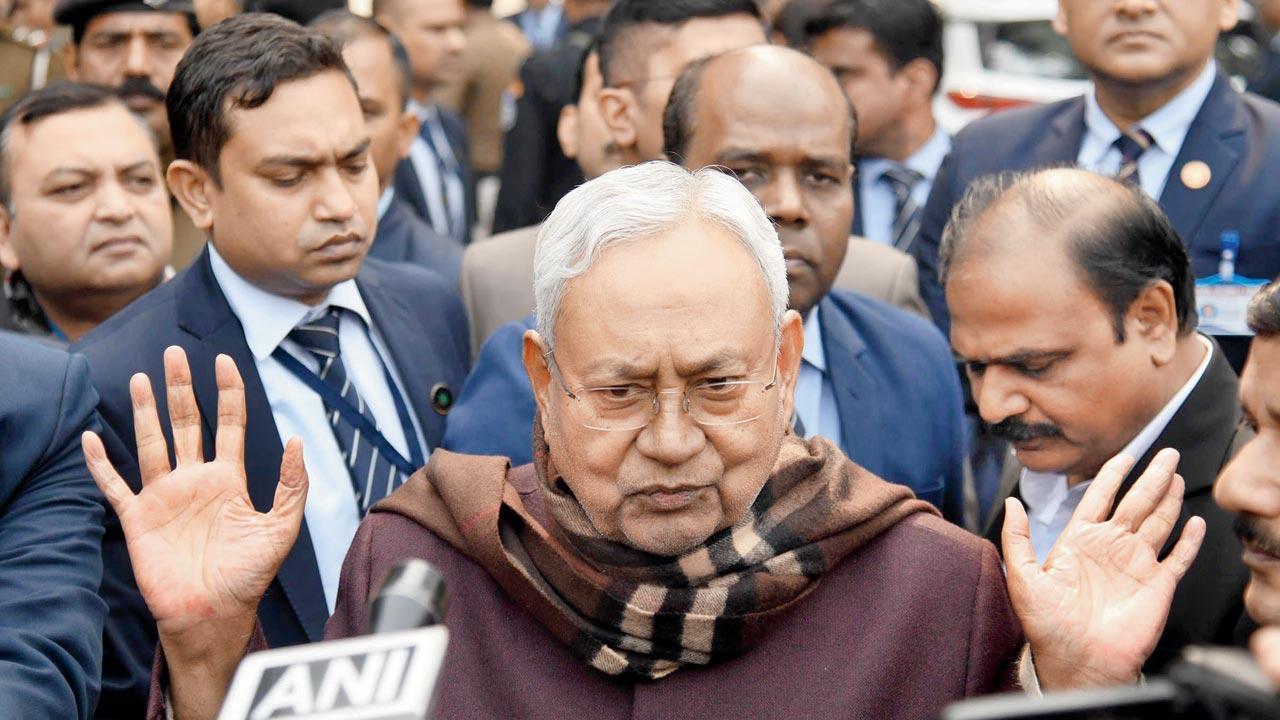Like the root vegetable, Bihar’s CM—who hasn’t been able to expand his base to come to power on his own—mixes well with any dish but is far from the main course. His palatability is only diminishing

Bihar Chief Minister Nitish Kumar in Patna on January 28. Pic/Getty Images
 During the 2020 campaign for the Bihar Assembly elections, Chirag Paswan, the heir to the late Ram Vilas Paswan’s legacy, broke away from the National Democratic Alliance and fielded candidates in only those seats which Bihar Chief Minister Nitish Kumar’s Janata Dal (United) was contesting.
During the 2020 campaign for the Bihar Assembly elections, Chirag Paswan, the heir to the late Ram Vilas Paswan’s legacy, broke away from the National Democratic Alliance and fielded candidates in only those seats which Bihar Chief Minister Nitish Kumar’s Janata Dal (United) was contesting.
Paswan’s strategy was to deny Dalit votes to the JD(U). He was widely suspected to have been the pawn of the Bharatiya Janata Party, eager to cut Kumar down to size for his past betrayal and ensure his party did not emerge as the biggest among the NDA’s constituents.
In case Paswan’s plot succeeded, would the BJP claim the post of chief minister? I had taken this question to political scientist Professor Rakesh Ranjan, of Patna University. Ranjan said the BJP would still let Kumar become the chief minister. Why? Because Kumar is the potato of politics, the professor replied.
Potato?
That’s right. When two dishes match in savouriness, the one with the potato acquires a bounce, a tastier edge. The BJP had 41 more seats than the JD(U), yet it allowed Kumar to become the chief minister. The BJP knew he would be as acceptable to the Rashtriya Janata Dal-led Grand Alliance as he was to the NDA.
Call it the potato syndrome of Indian politics!
Cook the potato with any vegetable, or with mutton or chicken, or add the potato to the recipe of biryani, and none of these dishes would be fundamentally transformed in taste. Likewise, whether Kumar is in the NDA or the I.N.D.I.A alliance, neither would undergo a radical change in character. The NDA’s Hindutva flavour is not altered because of Kumar’s presence or absence. The notion that the I.N.D.I.A alliance represents the idea of composite culture will persist, even without Kumar.
Imagine the potato with a mind and overweening ambition, and you will have understood Kumar’s somersaults.
The potato is rich in carb and low in protein, perhaps the reason behind its popularity as a side dish—French fries and mashed potatoes, for instance. Kumar has been the chief minister of Bihar since 2005, but for a gap of eight months. For all his strivings, he has not been able to expand his base to the point where he can come to power on his own, to become a sought-after, stand-alone dish, so to speak, such as the cauliflower or mutton curry.
Kumar suffers the potato’s unenviable fate. On a table with five dishes, even a savoury potato preparation—for instance, the aloo charchari (chorchori in Bengal), the stir-fried potato dish popular in Bihar—is seldom the biggest draw. The potato’s popularity today is largely as a filling in the samosa, as a mix in the chaat, as a stuffing for the paratha. Likewise, Kumar must be in one alliance or another to retain his importance.
But the two dominant alliances—the one led by the RJD and the other by the BJP—too require Kumar for coming to power. It was for this reason the RJD conceded the chief ministerial chair to Kumar even though it had more seats than those of the JD(U) in 2015 and 2022. The BJP did the same in 2020 and now, in 2024. These two formations cannot do without him, as the samosa cannot with the potato.
Kumar’s importance, though, is now steadily declining. From the high of the JD(U) winning 115 seats in 2010, its tally came down to 43 in 2020—quite like the potato losing ground in recent years, because of people heeding the medical advice that its consumption increases weight and aggravates the sugar level in the pre-diabetic. No wonder the steamed momo is threatening to replace the aloo samosa in popularity!
The potato is hobbled by its inherent properties. So is Kumar, whose Kurmi caste is just too small in Bihar to count decisively. He courted the categories of Extremely Backward Classes and Maha-Dalits, but found many of his supporters have veered away to parties anchored to one small caste or another. Quite a few have acquired a liking for the saffron. When the spread on the table caters to the separate tastes of a medley of guests, the potato as a dish is the first choice of few.
Once it was said, “Jab tak samosa mein rahega aloo, Bihar mein rahega Lalu. (As long as the samosa has the potato, Bihar will have Lalu.)” But Kumar has had a longer tenure as chief minister than Lalu Prasad Yadav, whose popularity outstrips the former’s by a margin.
Yadav, unlike Kumar, has not made ideological compromises for power. He and the BJP have to be alternative choices for voters, just as butter chicken and mutton curry cannot be mixed together to create a new dish.
Ideological compromises are built into Kumar’s politics, for his ambition is incommensurate with his popularity. From one alliance to another, he must shift in order to remain in power. His paranoia over being dethroned has grown as he has weakened with time. Just like old, soggy potatoes melt into the gravy and lose their distinctive identity, so will likely the JD(U) in a year or so.
The writer is a senior journalist
Send your feedback to mailbag@mid-day.com
The views expressed in this column are the individual’s and don’t represent those of the paper
 Subscribe today by clicking the link and stay updated with the latest news!" Click here!
Subscribe today by clicking the link and stay updated with the latest news!" Click here!










